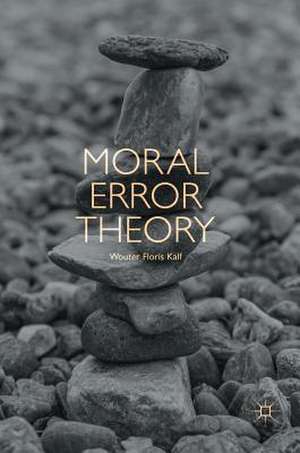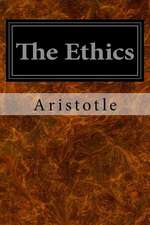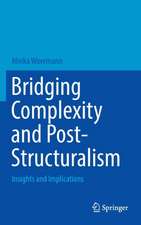Moral Error Theory
Autor Wouter Floris Kalfen Limba Engleză Hardback – 13 iun 2018
| Toate formatele și edițiile | Preț | Express |
|---|---|---|
| Paperback (1) | 580.36 lei 6-8 săpt. | |
| Springer International Publishing – 2 feb 2019 | 580.36 lei 6-8 săpt. | |
| Hardback (1) | 642.03 lei 6-8 săpt. | |
| Springer International Publishing – 13 iun 2018 | 642.03 lei 6-8 săpt. |
Preț: 642.03 lei
Preț vechi: 755.33 lei
-15% Nou
Puncte Express: 963
Preț estimativ în valută:
122.89€ • 133.53$ • 103.30£
122.89€ • 133.53$ • 103.30£
Carte tipărită la comandă
Livrare economică 21 aprilie-05 mai
Preluare comenzi: 021 569.72.76
Specificații
ISBN-13: 9783319772875
ISBN-10: 3319772872
Pagini: 245
Ilustrații: XIII, 246 p.
Dimensiuni: 148 x 210 mm
Greutate: 0.46 kg
Ediția:1st ed. 2018
Editura: Springer International Publishing
Colecția Palgrave Macmillan
Locul publicării:Cham, Switzerland
ISBN-10: 3319772872
Pagini: 245
Ilustrații: XIII, 246 p.
Dimensiuni: 148 x 210 mm
Greutate: 0.46 kg
Ediția:1st ed. 2018
Editura: Springer International Publishing
Colecția Palgrave Macmillan
Locul publicării:Cham, Switzerland
Cuprins
Part I. Moral Error Theory.- Chapter 1. Introduction.- Chapter 2. Conceptual Entailment Error Theory.- Chapter 3.Presupposition Error Theory.- Chapter 4. Rationality.- Part. II.Normative Ethics.- Chapter 5. Some Solutions to the Now What Problem.- Chapter 6. Substitutionism.- Chapter 7. Application.- Chapter 8. Conclusion.- Index.
Recenzii
“In his thorough, lucid, rich, and valuable book Wouter Kalf investigates how we should understand the error theory, what the best arguments for it are, and what we should do if we come to accept it. … It is essential reading for all of those interested in whether there are any genuine moral obligations.” (Richard Rowland, The Philosophical Quarterly, May 30, 2019)
Notă biografică
Wouter Floris Kalf is Postdoctoral Researcher and Assistant Professor in philosophy at Utrecht University, The Netherlands. Dr Kalf has taught philosophy at the universities of York, Bristol, Leeds, and various universities in the Netherlands. He has published on metaethics in such journals as Philosophical Studies and The Journal of Value Inquiry.
Textul de pe ultima copertă
This book provides a novel formulation and defence of moral error theory. It also provides a novel solution to the so-called now what question; viz., the question what we should do with our moral thought and talk after moral error theory. The novel formulation of moral error theory uses pragmatic presupposition rather than conceptual entailment to argue that moral judgments carry a non-negotiable commitment to categorical moral reasons. The new answer to the now what question is pragmatic presupposition substitutionism: we should substitute our current moral judgments, which pragmatically presuppose the existence of categorical moral reasons with ‘schmoral’ judgments that pragmatically presuppose the existence of a specific class of prudential reasons. These are prudential reasons that, when we act on them, contribute to the satisfaction of what the author calls ‘the fundamental desire’; namely, the desire to live in a world with mutually beneficial cooperation.
Caracteristici
Argues for a new version of moral error theory Reformulates the moral error theory in metaethics in terms of pragmatic presuppositions rather than conceptual entailments Offers a new substitutivist response to the ‘then what?’ question of what should happen after we come to recognise that the moral error theory is true
















